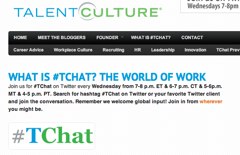Thanks to @ilovegarick, I checked into this evening’s #TChat – “At the intersection of talent and culture”, as it says on their web page. There was lots of talk about communities of all sorts, but especially about talent communities — people of similar talents, jobs, work gathering together for mutual benefit. Here are a few things I had to say during the chat.
If you want to join in on the #TChat fun, it happens each Wednesday night at 7pm EDT/4 pm PST. You can use your own Twitter client or the TweetChat.com service to aid you in your participation.
Tonight’s topic was Talent Communities. I must admit, the term wasn’t familiar to me. Before the chat I headed over to Wikipedia for more information.
Link: Talent Community from Wikipedia.com
- As much as we might like to have “terms” we can hang our hats on, I wouldn’t get so tied up in the terminology.
- Communities require that you join them, not be a member by default. You have to engage.
- Sometimes your community isn’t enough. You need to go out and join the communities that have the people you are seeking to recruit
- i.e. If you are recruiting programmers, you better be on the programmer’s forums. That is where the talented people often are
- Important to remember too that you are never just a member of one community. We all have multiples in our lives and work
- For people, a community is yet another place to show people “what you do and how well you do it” which is so needed for all workers
- In some ways, you entire life is your community. Just as likely to meet candidates at Starbucks as in an office or job fair
- You need to be aware of talent no matter what you are or what you are doing. Your next placement could come from a fellow gym member
- The best communities are already, by default, showing you who has the best “chops/skills/energy” You just need to listen to them.
- Finding talent should be integrated into you life. Something you always do. Not limited to specific situations, times, communities
- You need to be careful that you don’t create too many “silos” in your life, all compartmentalized. Let things blend and bleed together
- I like to think I have one community — mine, but it has a lot of different neighborhoods, each with their own character
- I’ve never been able to draw lines between personal and professional life. They mush together waaaay to much for that. I am me, period
- So here is the rub, though. I don’t think you can form a talent community from the outside, I think those with the skills do it together
- As a recruiter, I think you need to be more focused on finding useful communities than trying to create/recreate your own
- You can’t force people to interact. That is for sure. It has to come naturally. They have to have something interesting to say.
- You create your own personal community every day. Bring in those people who are interesting/useful to you and enjoy.
- I would say that the manufacturing of a community can be very low key, though. Hey, come over to #tchat tonight and let’s talk for example. Give them a place to gather.
- Your communities are a collection of overlapping and intersecting bubbles. They all effect each other as you bring info from 1 to other
- I think I have come around to the fact that we should be joining other communities, not trying to create our own world. Go find them.
- Go where people are already discussing their work – telling others “what they do and how well they do it” Why need our own – Is it control?
- Smart folks treat every job as freelance/contract and shouldn’t stop networking, etc. More people need to do that.
- Companies can use Talent Communities to develop collection of talented people they can turn to when in need. Need a programmer? Here are 30+ to choose from.
- Companies shouldn’t wait for great candidates to send in a resume from an ad. They should be building a list continuously.
- There is never really a lack of talent. More likely the company doesn’t know where talent is. Needs to go find it.
- Major reason companies need to be reaching out/cultivating communities more, in fact


